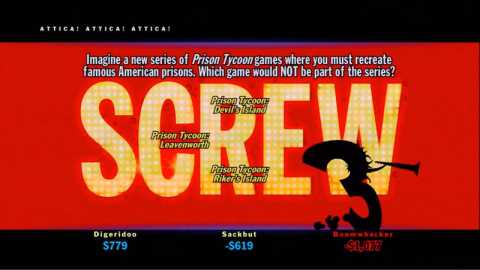
Speaking broadly, it’s kind of startling how little fiddling Jellyvision seems to have done with the old YDKJ formula here, and if you have fond memories from the 1990s of huddling around a PC, chuckling at fake backstage banter and silly mock commercials, you ought to know what to expect, almost to a vertigo-inducing degree. The basic structure of a game; the simple, colorful look of the motion graphics that dominate the game’s visuals; hell, they even got Cookie Masterson back as the disembodied host voice, who was the most prolific (also, totally the best!) YDKJ host during the series’ original run. But that doesn’t mean this is just a nostalgia trip, and while the text-heavy presentation might feel a little dated, there’s nothing about the game’s structure that feels exclusionary for new players. The group that potentially won’t get as much enjoyment out of YDKJ are those unfamiliar with American pop culture, which the game mines relentlessly for its sense of humor and much of the actual trivia.

Everything I’ve just described about YDKJ is just as applicable to the very first game in the series as it is to this brand-new 2011 release, and I think that’s a good thing. Trivia games that rely purely on trivia knowledge are dry, but games that rely too heavily on random reversals of fortune are just frustrating. You need a little random chance, and it doesn’t hurt when you build some vindictiveness into the format, because getting ahead is more fun when you’re pushing someone else down in the process.
All that’s not to say the game’s not without its tweaks. There are a few new types of questions to help keep things fresh, as well as a huge bonus for choosing one, very specific wrong answer in a game, but more significant is how the game hems closer to the faux-game-show format that the series has always implied by actually dividing it into discreet, static episodes, which means a couple things for the gameplay. On the upside, since the question ordering isn’t random, you’ll never see a question you’ve already been presented, unless you specifically go back and play an episode you’ve already seen. This, to me, is huge, since there is basically nothing worse in a trivia game than getting repeat questions. This structure also allows the game to build themed series’ of questions, often for contrasting comedic effect. The downside is that any given episode is, essentially, single use, since the same questions are presented in the same order, every time, though this is mitigated by the fact that there is just a huge number of episodes included with the game. A full game of YDKJ can be played in around 10 to 15 minutes, which means that you’re looking at roughly 15 to 20 hours of game time with all of the questions that are included on the disc. Jellyvision and THQ have already released a DLC pack of additional questions, and seem to have plans for more down the road, potentially extending the game’s life even further.

I think it’s interesting that there’s some question as to whether YDKJ would’ve been better served as a purely downloadable title, since the series origins lie in the multimedia heyday of the mid-90s, where the CD-ROM storage medium itself was the lynchpin of the entire experience. Either way, I think this game represents a terrific value, not just in terms of sheer volume, but the level of craft that is so often notably absent from trivia video games.